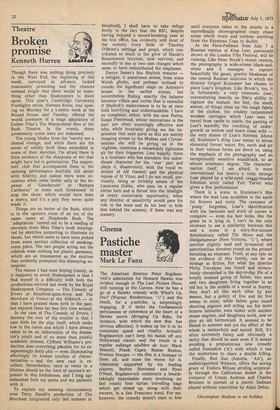Theatre
Broken promise
Kenneth Hurren
Though there was nothing doing precisely in the West End, the beginning of this week, surveyed in advance, looked reasonably promising and the chances seemed bright that there would be something other than Shakespeare to dwell upon. This year's Cambridge University Footlights revue, Norman Ruins, was opening on Monday for a London week at the Round House, and Tuesday offered the world premiere of a stage adaptation of Esther Vilar's The Manipulated Man at the Bush Theatre. In the events, these promissory notes were not redeemed.
The young blades from the 'varsity are a dismal vintage, and while there are the seeds of validly droll ideas embedded in some of their sketches, I'm afraid there is little evidence of the sharpness of wit that might have led to germination. The supporters' club that accompanied them to the opening performance dutifully fell about with hilarity, and indeed there were occasions when some feeble sally at the expense of ' Gawdstruth ' or 'Barbara Carthorse' or some such threatened to stop the show; which would have been a mercy, and it's a pity they never, quite made it.
Things are no better at the Bush, which is in the upstairs room of an inn of the same name at Shepherds Bush. The ' adaptation ' turned out to be a reading of excerpts from Miss Vilar's book interrupted by sketches purporting to illustrate its thesis, but which seem to have been picked from some ancient collection of smokingroom jokes. The two people acting out the rubbish wear nothing but plastic garments, which are as transparent as the motives that evidently prompted this dismaying enterprise.
The reason I had been hoping (vainly, as it happens) to avoid Shakespeare is that I find myself in a difficulty with both the productions revived last week by the Royal Shakespeare Company — The Comedy of Errors at Stratford-upon-Avon and The Merchant of Venice at the Aldwych — in that I have praised them both in the past, but enjoyed them far less this time around.
In the case of The Comedy of Errors, I daresay the root of the trouble is that I care little for the play itself, which ranks low in the canon and which I have always taken to be an indiscretion of the dramatist's youth and of no more than painfLl academic interest. Clifford Williams's production does everything pbssible for its exasperatingly dotty plot — even illuminating affectingly its human touches of characterisation — and the new cast is excellent. Nevertheless, once or twice in a lifetime should be the limit of anyone's exposure to this foolishness, and I long ago exhausted both my quota and my patience with it.
To explain my seeming inconsistency over Terry Hands's production of The Merchant (originated only last summer at Stratford), I shall have to take refuge firstly in the fact that the RSC, despite having enjoyed a record-breaking year at the box office, has evidently sold most of the scenery (very little of Timothy O'Brien's settings and props, which contributed, so much to the glow of Hands's Renaissance fairytale, now survive), and secondly in one or two cast changes which seem to have redistributed the emphases.
Emrys James's fine Shylock remains — a refugee, it sometimes seems, from some Welsh ghetto, and perhaps inclined to overdo the significant slaps on Antonio's breast in the earlier scenes, but nevertheless finding exactly the balance between villain and victim that is essential if Shylock's malevolence is to be at once both horrifying and understandable. I have no complaint, either, with the new Portia, Susan Fleetwood, whose innovations in the part are often stunningly effective and who, while invariably giving me the impression that such parts as this are merely stepping stones to the Medeas and Clytemnestras she will be giving us in the 'eighties, contrives a remarkably lightsome air for their fripperies. Less happily, there is a Gratiano who has mistaken this subordinate character for the ' star ' part and plays it, disastrously, with the vocal restraint of Alf Garnett and the physical repose of St Vitus; and I do not recall, previously, being so irritably aware of the Launcelot Gobbo, who puts on a regular circus turn and is thrust into the limelight at every conceivable opportunity, when any director of sensitivity would pare his role to the bone and do his best to hide him behind the scenery; if there was any scenery.






















































 Previous page
Previous page